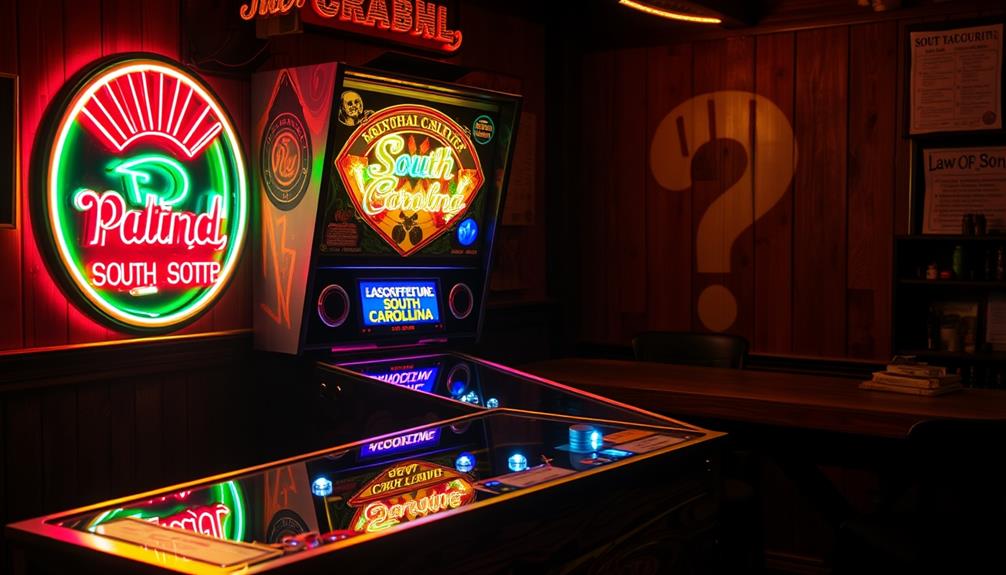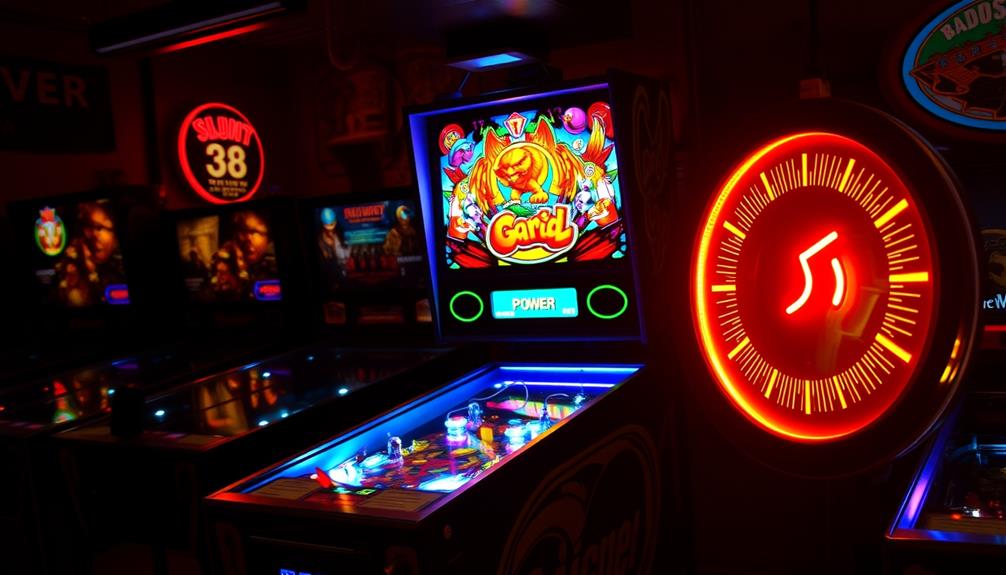In South Carolina, minors under the age of 18 are prohibited from playing pinball. This legislation originated in the 1940s due to pinball being perceived as a gambling instrument. Even though pinball has evolved into a game of skill, the restriction for minors has remained in place. Notably, there is minimal enforcement of this law, as there have been no reported incidents of minors facing charges for playing pinball. There is currently a movement to amend this legislation, as a new bill aims to remove these limitations. If you are interested in learning more about the ongoing initiatives and the changing cultural attitudes towards pinball, there is a wealth of information to explore.
Key Takeaways
- Pinball is illegal for individuals under 18 in South Carolina due to historical concerns about gambling.
- The ban, originating in the 1940s, classifies pinball as a game of chance despite its skill-based nature.
- Enforcement of the ban is minimal, with no known charges against minors for playing pinball.
- Legislative efforts, like Bill H. 3227, are currently underway to repeal the ban on minors playing pinball.
- Community support for legalizing pinball is growing, emphasizing its benefits for youth engagement and local businesses.
Legal Status of Pinball
In South Carolina, pinball's legal status is quite restrictive, especially for those under 18 years old. The law makes it illegal for anyone under this age to play pinball, reflecting historical concerns about gambling that date back to the 1940s. This classification stems from viewing pinball as a game of chance rather than a game of skill, even though it evolved into a skill-based game with flippers in the 1970s.
Some might argue that this perspective is outdated, especially considering the health benefits of recreational activities like playing games, which can enhance cognitive skills and provide stress relief cold medications overview.
Interestingly, South Carolina stands alone as the only state with such a prohibition against minors playing pinball, while most states have recognized the game's recreational value and repealed similar restrictions. Although the law exists, enforcement is virtually nonexistent; there are no known charges against minors related to pinball.
Recently, there have been legislative efforts to change this outdated law. House Minority Leader Todd Rutherford has sponsored a bill aimed at repealing the ban and modernizing the legislation to better reflect current views of pinball as a fun, skill-based activity.
If successful, this could pave the way for a more inclusive environment for all ages to enjoy pinball in South Carolina.
Historical Background of the Ban
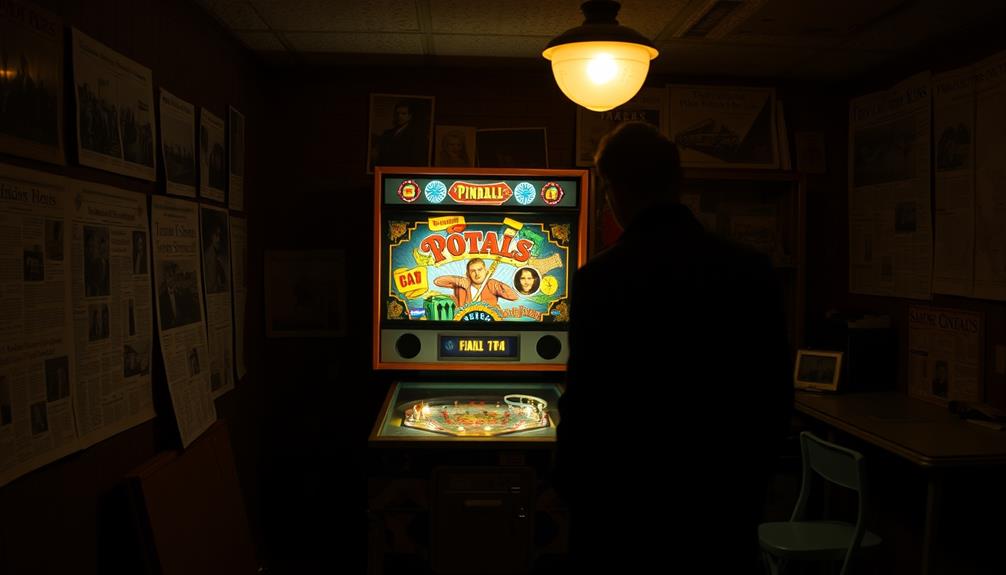
You might be surprised to learn that the ban on pinball for those under 18 in South Carolina dates back to the 1940s.
At the time, officials viewed it as a game of chance, worrying that kids would waste their money on what they saw as a gambling device.
Curiously, the perception of games and their impact on youth has evolved, similar to how astrological compatibility can influence relationship dynamics today.
Despite its origins, enforcement of this ban has been nearly nonexistent in recent years, showing a shift in how pinball is perceived today.
Origins of the Ban
Why did South Carolina enforce a ban on pinball that's lasted for decades? The origins of this ban trace back to the 1940s when pinball machines were seen as gambling devices. Store owners often offered prizes, leading to the classification of these machines as games of chance rather than skill. This perception created a moral panic about youth spending their time and money on what many viewed as a vice.
The intense emotions surrounding the ban echo similar sentiments seen in the context of mental health, such as the stigma surrounding BPD and its treatment.
Key factors in the origins of the ban on pinball include:
- Association with organized crime and illegal gambling
- Concerns about minors wasting time and money
- The law's unchanged status for over 60 years
- Persistence of outdated views despite pinball's evolution into a game of skill in the 1970s
Even though pinball now incorporates strategic elements, the prohibition continues, reflecting ongoing fears about gambling and its financial implications for children.
South Carolina remains the only state with such stringent restrictions, highlighting how historical concerns shape current legislation. Understanding these origins sheds light on why the ban persists today and its implications for players in the state.
Historical Enforcement Issues
Despite the long-standing ban on pinball for individuals under 18 in South Carolina, enforcement has been particularly lax. This ban, rooted in historical concerns about gambling and youth wastefulness dating back to the 1940s, has seen little actual enforcement. In fact, there are no known charges against minors for simply playing pinball.
The stigma surrounding pinball primarily stems from its classification as a game of chance, especially when prizes are involved, which has contributed to the ongoing debate about its legality. Financial implications in divorce may echo similar concerns about regulation and control over youth activities.
Interestingly, establishments like Bang Back Pinball Lounge have emerged, catering to all ages and operating with relative impunity. This flexibility showcases how the law remains largely unenforced, allowing minors to enjoy pinball without fear of repercussions.
However, attempts to repeal the ban on pinball have faced significant legislative challenges, with previous proposals stalling in the Senate despite growing community support. The disconnect between the law and its enforcement raises questions about the relevance of such historical regulations in today's culture, reflecting a need for reevaluation in light of current attitudes toward pinball and gaming.
Recent Legislative Developments
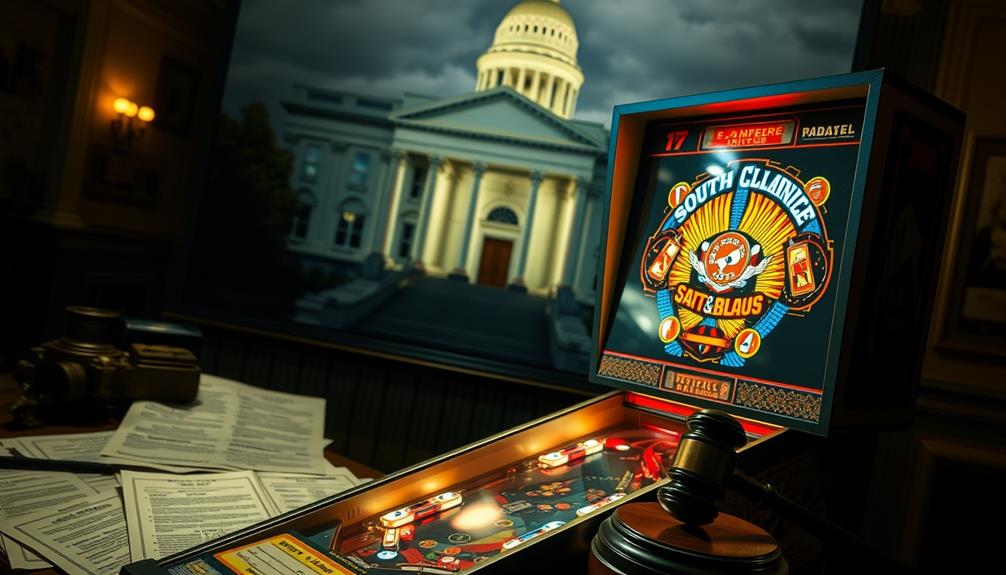
You might be interested to know that Bill H. 3227, which seeks to lift the ban on minors playing pinball, has made its way to the House floor with unanimous support.
This legislative progress reflects a broader trend toward high-quality content that resonates with community values.
Community backing, including local law enforcement, highlights a growing call for change in this outdated law.
However, past attempts to reform pinball legislation have faced hurdles, particularly in the Senate.
Bill H. 3227 Progress
Recently, Bill H. 3227 has gained significant momentum in the South Carolina legislature, marking a pivotal moment in the fight to legalize pinball for minors. Sponsored by House Minority Leader Todd Rutherford, this bill seeks to repeal the outdated prohibition on minors under 18 playing pinball machines.
This legislative change reflects a broader trend of fostering innovation and creative expression, akin to the principles of design thinking that empower communities to advocate for their recreational interests.
The progress of Bill H. 3227 demonstrates strong bipartisan support, as it has advanced unanimously to the House floor. This shift reflects a growing recognition of pinball as a skill-based game rather than a game of chance.
Here are some key points regarding its progress:
- The bill's advancement indicates increasing legislative support for recreational activities among youth.
- Previous attempts to change the law have faced challenges, but this bill appears more promising.
- Community backing from law enforcement and local business owners has fueled momentum.
- National trends toward legalization align with the objectives of Bill H. 3227.
As you follow the developments surrounding this bill, it's clear that the movement to normalize pinball for minors is gaining traction, paving the way for a more inclusive recreational landscape in South Carolina.
Community Support for Change
As community members rally around Bill H. 3227, support for its passage has become increasingly evident. This proposed legal change aims to repeal the prohibition on minors under 18 playing pinball, a move that reflects the shifting perspectives on the game.
Local law enforcement, including Chester County Sheriff Max Dorsey, backs the bill, emphasizing that pinball should be seen as a skill-based activity rather than a gambling endeavor. Understanding the importance of community engagement is crucial, as it can lead to positive financial health through support for local businesses and recreational activities.
Community engagement has been robust, with business owners like Frederick Richardson advocating for the bill, highlighting the social and recreational benefits pinball offers children. The growth of the pinball community in South Carolina supports this call for change, with a remarkable 58% increase in participation and impressive turnout at local events.
This surge underscores the demand for legislation that fosters youth participation in pinball. The momentum behind Bill H. 3227 demonstrates a collective desire to modernize outdated laws and create a more inclusive environment for young players.
With strong support from various segments of the community, it seems that the time for change has finally come. Shall we continue to push for this positive transformation in South Carolina?
Historical Legislative Challenges
The journey toward repealing the pinball prohibition for minors in South Carolina has been fraught with historical legislative challenges. You might find it surprising that, despite recent support, the road to change hasn't been smooth.
Several factors have contributed to the ongoing struggle, including the need for regulatory compliance to guarantee the updated laws align with current views on gaming. Past bills, like the one that passed the House, have died in the Senate. The current bill, H. 3227, has gained unanimous committee support. Local law enforcement and business owners back the push for modernization.
Opposition from gambling associations has complicated legislative efforts. Concerns about gambling influences on youth spending continue to loom large. These apprehensions often lead to resistance against changes that could allow minors to play pinball, even though it's widely recognized as a game of skill rather than gambling.
Advocates argue that the law is outdated and that allowing minors to enjoy pinball aligns with modern views on gaming. As H. 3227 heads to the House floor, you may wonder if this time will finally mark a turning point in the state's approach to pinball and youth engagement.
Stay tuned as the legislative challenges unfold.
Community Perspectives on Pinball
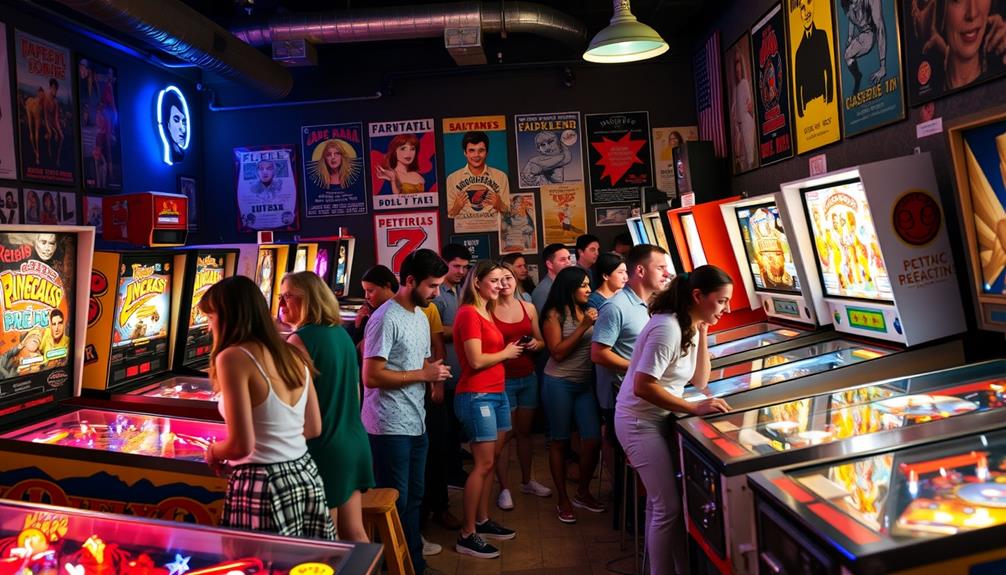
Community members frequently rally around the idea that pinball should be more accessible to minors, highlighting its potential as a valuable recreational activity. Many argue that pinball promotes social interaction and skill development, making it an ideal pastime for kids. Local business owners, like Frederick Richardson of Bang Back Pinball Lounge, express frustration over outdated laws that label pinball as gambling, which restricts youth participation.
To illustrate community support, consider the following table showcasing the benefits of youth involvement in pinball:
| Aspect | Benefits | Community Impact |
|---|---|---|
| Social Interaction | Builds friendships | Fosters a sense of belonging |
| Skill Development | Enhances hand-eye coordination | Encourages teamwork |
| Family Engagement | Creates a safe atmosphere | Strengthens family bonds |
| Nostalgia vs. Gambling | Reframes public perception | Advocates for legislative reform |
Events like Saturday morning gatherings provide a safe space for families, while leagues like Little Flippers cater to children aged 4-12. These initiatives showcase a growing movement to redefine pinball, advocating for its recognition as a skill-based activity rather than just a relic of gambling.
Economic Impact on Local Businesses
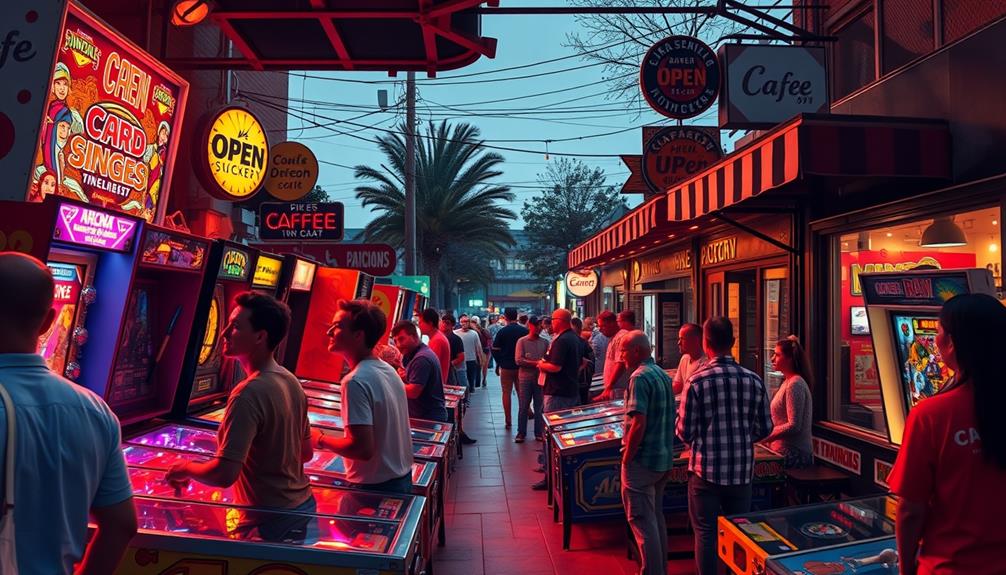
Pinball's legal restrictions in South Carolina hinder local businesses' growth and potential. The ban on minors playing pinball creates significant challenges for establishments like Bang Back Pinball Lounge. Owners worry that this outdated law limits their ability to attract a family-friendly clientele and curtails economic potential.
Additionally, many entrepreneurs in the area are seeking best ways to make money online to supplement their income while maneuvering these challenges.
Consider the impact on local businesses:
- Reduced foot traffic: Families are less likely to visit when entertainment options are limited.
- Missed revenue opportunities: With fewer patrons, businesses lose out on potential earnings from food, drinks, and game fees.
- Limited social engagement: The absence of a vibrant arcade culture restricts opportunities for social interaction.
- Youth recreational options: The ban stifles alternatives to screen time for children, affecting community well-being.
The lack of enforcement means many operate in a gray area, trying to balance compliance with the desire to provide recreational activities.
Advocacy for changing the law is growing among local business owners, who believe that legalizing pinball for minors could boost traffic and revenue in family-oriented entertainment venues.
Embracing this change could release the economic potential that pinball offers to the community.
Youth Engagement and Recreation

Engaging youth in recreational activities can be a challenge in South Carolina, especially with the current restrictions on pinball. Although individuals under 18 can't play pinball in SC, local establishments are stepping up to foster youth engagement. Places like Bang Back Pinball Lounge host family-friendly events, creating safe spaces for children.
To illustrate the benefits of recreational activities like pinball, consider the following table:
| Activity | Benefits |
|---|---|
| Pinball Competitions | Skill development, teamwork |
| Family Events | Community bonding |
| Structured Leagues | Social interaction, fun |
Leagues such as Little Flippers cater to kids aged 4 to 12, promoting social interaction and healthy competition. Community leaders are advocating for changes to the law, emphasizing that pinball is a skill-based game rather than a gambling risk. This shift in perception can enhance youth participation and community engagement in recreational activities.
Ultimately, allowing minors to play pinball could provide a healthier alternative to screen time and encourage families to engage in fun, interactive experiences together.
Advocacy for Legal Changes
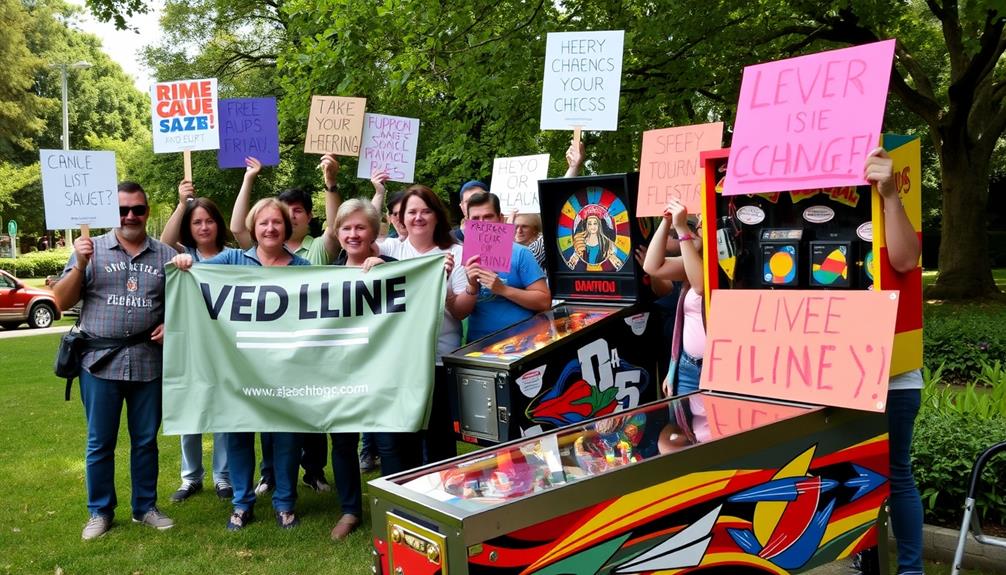
There's a growing movement in South Carolina advocating for changes to the laws surrounding pinball, particularly the restriction that keeps minors from playing.
Led by House Minority Leader Todd Rutherford, the push to legalize pinball for younger players is gaining traction. The bill he introduced has received unanimous support in preliminary legislative sessions, showcasing a strong consensus among lawmakers.
This initiative parallels efforts in other areas, such as promoting outdoor activities like hiking and camping, which also aim to engage youth in positive experiences unique camping experiences.
Local arcade owners and community members, including those from places like Bang Back Pinball Lounge, are rallying behind this cause. They emphasize the importance of providing safe and legal gaming opportunities for youth.
Here are some key points highlighting the advocacy efforts:
- Community Engagement: Youth leagues and family-friendly events are being organized to showcase the positive aspects of pinball.
- Support from Lawmakers: The bill has garnered significant bipartisan backing, indicating a shift in legislative attitudes.
- Public Perception: Efforts are underway to change the view of pinball from a game of chance to one of skill.
- Overcoming Obstacles: Previous attempts faced challenges from gambling associations, but advocacy is pushing forward.
With these developments, the future of pinball in South Carolina looks promising.
Pinball and Gambling Misconceptions
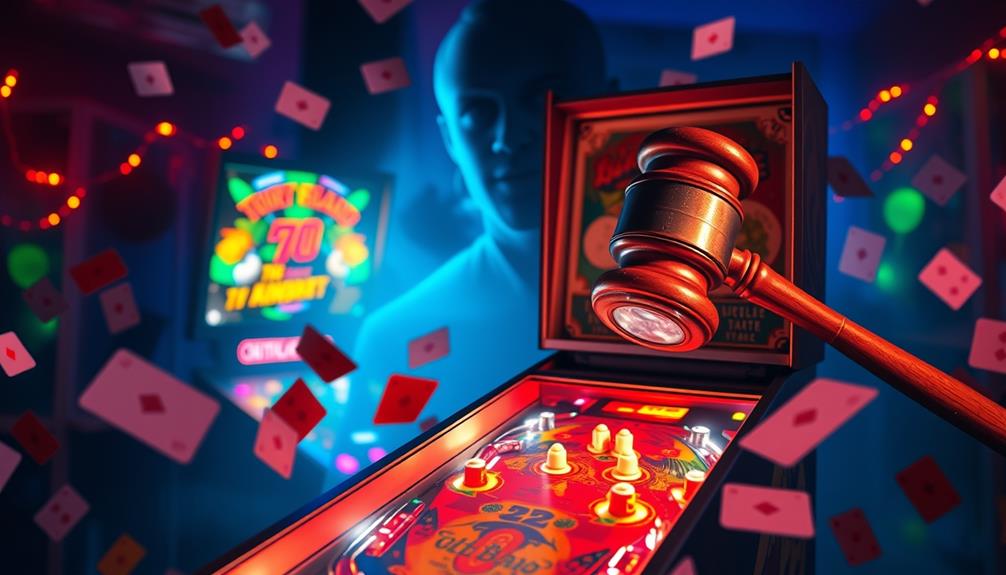
The classification of pinball in South Carolina has led to widespread misconceptions about its nature, often lumping it in with gambling activities. Many people mistakenly view pinball as a game of chance, but that couldn't be further from the truth. Since the introduction of flippers in the 1970s, pinball has been recognized as a game of skill, dependent on player strategy and precision.
The prohibition of pinball for those under 18 stems from fears that youth might engage in gambling-like behaviors. However, community advocates argue that this perspective is misguided. Unlike traditional gambling, which relies heavily on luck, pinball requires skill and practice to master.
Despite these facts, misunderstandings continue to persist in public perception, leading many to equate pinball machines with gambling devices. While enforcement against minors has been minimal, the stigma remains.
There's a growing push for legislative change to clarify the distinction between pinball and gambling. This effort emphasizes the importance of pinball as a recreational activity that promotes social interaction and skill development, especially among the younger generation.
It's time to address these misconceptions and celebrate pinball for what it truly is.
Future of Pinball in South Carolina
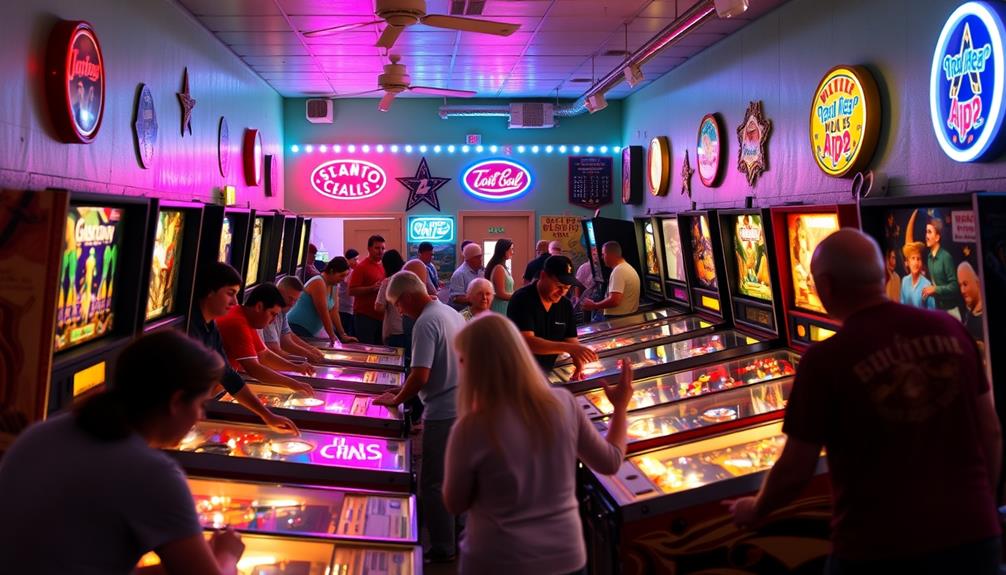
Advocacy efforts are gaining momentum in South Carolina to lift the restrictions on pinball for minors, creating a promising outlook for the game's future. As the push for legislative changes continues, the potential for increased youth participation in pinball grows. If the pinball prohibition is repealed, everyone stands to benefit.
- Local businesses, like Bang Back Pinball Lounge, expect economic growth from a broader customer base.
- Recent reports show a 58% increase in pinball participation, indicating a thriving community.
- Advocates believe that legalizing pinball for minors will enhance social interaction and skill development.
- A cultural shift is underway, recognizing pinball as a legitimate recreational activity for all ages.
With these efforts, South Carolina could transform pinball into a staple pastime, allowing youths to engage in a game that fosters camaraderie while honing their skills.
Frequently Asked Questions
Is It Illegal to Play Pinball in South Carolina?
You might wonder if it's illegal to play pinball in South Carolina. Technically, there are restrictions for those under 18, but enforcement is rare. Most states allow minors to play without issue. In South Carolina, the law specifies that those under 18 are not allowed to play pinball machines between the hours of 10pm and 8am without parental supervision. However, this is not heavily enforced and many minors still enjoy playing pinball during these hours. In recent years, the rise of virtual pinball machines has also provided a way for younger individuals to experience the fun of pinball in a digital format, further blurring the lines of these age restrictions.
What State Is Pinball Illegal In?
Pinball's legality varies across states. In South Carolina, it's illegal for those under 18. You'll find most states allow minors to play, reflecting changing views on pinball as a skill-based rather than gambling game. However, some states still require minors to be accompanied by an adult when playing pinball. Despite the changing attitudes towards pinball, the game remains popular, leading to the production of more expensive pinball machines with advanced features and themes. These machines are often sought after by collectors and enthusiasts alike.
Is Pinball Considered Gambling?
You might think pinball's all about luck, but it's more skill than chance. Many see it as a game of strategy, especially since flippers transformed gameplay, making it less about gambling and more about technique.
Why Are Pinball Machines Illegal?
Pinball machines are illegal primarily due to historical concerns about gambling and youth spending. Lawmakers classified it as a game of chance, even as its skill-based aspects evolved, leading to outdated restrictions that persist today. Despite the evolution of technology and the modernization of pinball machines, the historical perception of the game as a gateway to gambling and a drain on youth spending still prevails. The history of pinball machines is often overshadowed by these concerns, making it difficult for advocates to overturn the ban on pinball machines in certain areas. Despite efforts to showcase the skill-based and non-gambling aspects of the game, the history of pinball machines continues to cast a shadow over their legality. This lingering stigma has made it a challenge for enthusiasts to shift public and legislative perceptions, even in regions where the cultural significance of pinball thrives. However, in areas where bans have been lifted, the turnaround often began when pinball machines became legal after being successfully argued as games of skill rather than chance. These shifts not only rejuvenate the popularity of pinball but also highlight the importance of updating laws to reflect modern understandings of classic games.
Conclusion
In South Carolina, the legal status of pinball remains a contentious issue, but change is on the horizon. With growing community support and advocacy, you might just see pinball machines lighting up local establishments soon. Remember, "where there's a will, there's a way." Embracing this classic game could not only boost local economies but also provide a fun, engaging outlet for youth. As discussions continue, the future of pinball looks promising in the Palmetto State.
